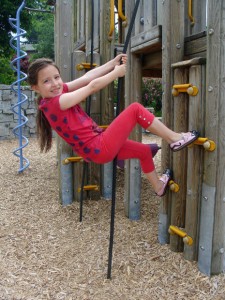 Noticing children is an excellent way to encourage them. Describe what you see to your child and she will learn to make accurate evaluations of her efforts and accomplishments. In this way, you become your child’s mirror, instead of her judge. For example, if your child says, “Mom, watch me climb up the side of the fort!” Instead of replying, “Good job, Honey,” which is judging her actions, you might say “Look at you scale that wall,” which not only acknowledges her, but describes her efforts in detail. Every time you encourage your child in this way, you reinforce that positive action in her mind, both by the phrase you choose, and indirectly, through the positive attention you shower over her.
Noticing children is an excellent way to encourage them. Describe what you see to your child and she will learn to make accurate evaluations of her efforts and accomplishments. In this way, you become your child’s mirror, instead of her judge. For example, if your child says, “Mom, watch me climb up the side of the fort!” Instead of replying, “Good job, Honey,” which is judging her actions, you might say “Look at you scale that wall,” which not only acknowledges her, but describes her efforts in detail. Every time you encourage your child in this way, you reinforce that positive action in her mind, both by the phrase you choose, and indirectly, through the positive attention you shower over her.
When you constantly evaluate your child, you tell her who you think she should be. Her perceptions of life and herself become separated into categories of “good” and “bad,” leaving little opportunity for growth or change. Judgment, such as this, underlies conditional love- love that makes demands. However, encouragement is about accepting your child for who she is- focusing on the effort and improvement, rather than on the child herself or the outcome. Acceptance which underlies unconditional love, lovingly shepherds from behind, allowing children to flourish, build strong attachments, and grow in wisdom and kindness.
Here are some simple guidelines to help you begin to notice your children rather than judge them:
-
Start your reply with the child’s name or the pronoun “you.” Practice alternating between “You did it!”, “Look at you!” or “I noticed ____.” and using the child’s name first in statements such as, “True, you put back all the stuffed animals.”or “John, you ran quickly when I called.” This will help you break the evaluation language of “Good” and “Great.”
-
Describe exactly what you see. Pause before you speak and ask yourself if a camera could record what you are about to say. For example, “Good job!” offers a child no specifics or mental image of what she accomplished.To speak with a “camera ready” response , you must speak specifically. “Evan, you saw that your sister forgot her bear and took it to her. Wow!”
-
Notice, describe, and then show appreciation. Noticing your child can take on added meaning if your response pattern also includes appreciation that identifies character. Consider, “Sam, you picked up the blocks. That was helpful.” or “Sarah, I noticed you worked on your essay and even edited the errors. That demonstrates such thoroughness.”These descriptions create a mental snap-shot of what it actually looks like to be helpful or thorough. Adding this step, you are noticing the child’s actions as well as connecting and identifying with their heart response.
Therefore encourage one another and build each other up. 1Thes 5:11a